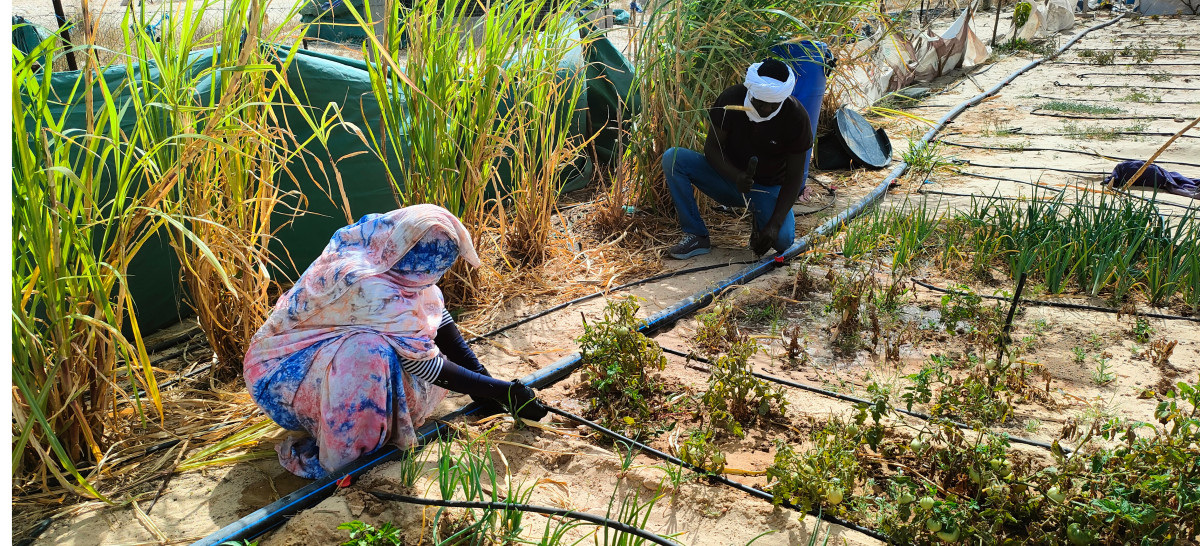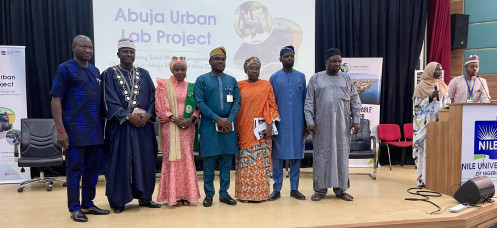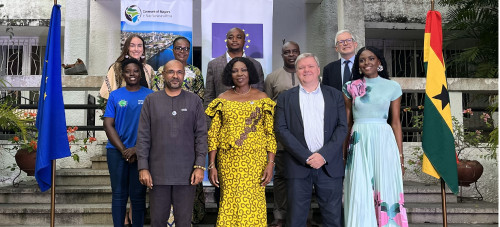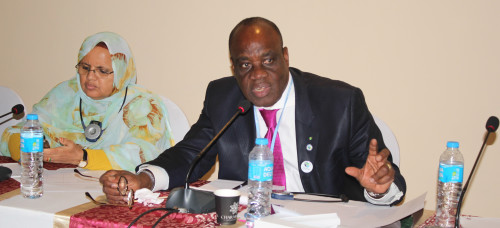The "Feeding and greening Nouakchott" experience, urban vegetable gardens in a desert climate
Published: 4 May 2023
Adaptation
Success Stories

At the beginning of 2021, during a major public ceremony, the Mauritanian Ministry of Rural Development granted the Region of Nouakchott a 10-hectare plot of land located on the outskirts of the capital, as well as a large batch of agriculture equipment intended for the development of agricultural land, the fruit of the cooperation efforts of the region with the State. The "Feeding and greening Nouakchott" project was born. Thus, one of the recommendations of the Action Plan for Sustainable Energy Access and Climate Action Plan (SEACAP), drawn up in 2020, has materialized: to develop urban and peri-urban agriculture in the city.
The perimeter, located 17 km south of the city (the pk17, as it is called here) on the Nouakchott-Rosso axis, was developed with the funds of the CoM SSA project co-financed by the European Union and the Spanish Agency for International Development Cooperation (AECID) . The development began with the leveling of the land, the creation of an access track and a protective fence, then the installation of a drip irrigation system and a solar water pump, the preparation of tons of compost, the construction of greenhouses, warehouses, enclosures for cattle, latrines, etc.
Once drip irrigation was installed, fruit trees and fodder plants were planted, which in turn serve as windbreaks, a necessity in this scorching desert climate with strong winds and high temperatures. This is how the 130 beneficiaries selected from a list of more than 1,400 applicants began to grow their vegetables, each on their own land. Few people would imagine seeing so much greenery in such a place, in the middle of the Sahara, especially in June, when the temperatures are higher and agricultural activity becomes more difficult. Queen Letizia of Spain witnessed this during her visit in 2022, which also coincided with a sandstorm, perhaps the most publicized in history.
We are in the second agricultural campaign of these courageous and persevering people, living in the suburbs and unemployed for a long time, but who have decided to cultivate the land, either as a job or as a complementary activity, accompanied by the Region of Nouakchott which mobilized a team of technicians to support and supervise the activity, as well as means of transport to support and facilitate the task of these urban farmers.
A new phenomenon has appeared in the surroundings: more and more land is cultivated by individuals, the local market is supplied with local vegetables at competitive prices and, above all, these people benefit from their work. Five years ago, few Nouakchott residents would have believed that it was possible to grow vegetables in their city.
Urban vegetable gardens as a strategy for urban resilience and sustainable development
A kilo of tomatoes on the Nouakchott market costs 30 ouguiyas (MRU), or 0.80 euros, a very high price if we take into account that the minimum wage in Mauritania is 3,000 MRU (+/- 80 euros) and that these tomatoes have traveled hundreds, even thousands of kilometers to get here. Mauritania is very dependent on food imports and, consequently, on price rises and falls, transport and other fluctuations . Nouakchott, the capital, which has more than 1.5 million inhabitants, "gobbles up" most of these imports, which come mainly from Morocco, Senegal, Spain, etc. Much of the city is below sea level, which means the ground has a high salt content. The water used to irrigate these vegetable gardens is waste water from the drinking water treatment plant of the national water company (SNDE), which carries water from the Senegal River, located 200 km away. This wastewater is stored and pumped through a solar energy system that powers the drip irrigation, with a water optimization circuit. No drop is wasted.
It hasn't been easy, and still isn't, but this project is here to stay, to generate a new trend in urban horticulture, to strengthen food sovereignty and food security in one of the countries where the malnutrition rate is the highest. The region of Nouakchott, which has another 10 hectare perimeter in another suburb of the city where it hopes to reproduce the experience of pk17, has already found a partner to develop agricultural activity there, and who knows, in a few years, we may see Nouakchott "Fed and Green".

Important national and international personalities visited the horticultural perimeter of pk17: the president of the Nouakchott region, Ms. Fatimetou Mint Abdel Malick, president of UCLG-Africa; the former Minister of Rural Development, Mr. Eddi Ould Zein; the Minister of Agriculture, Mr. Adama Bocar Soko; the Ambassador of the European Union in Mauritania, Mr. Gwilym Jones; the Ambassador of Spain, Ms. María Álvarez de la Rosa and her predecessor, Mr. Jesús Santos Aguado; the General Coordinator of the Spanish Agency for International Cooperation for Development (AECID), as well as members of the Regional Council, the Wali (governor) of Nouakchott-Sud, the Mayor of Riyadh (municipality where the perimeter of pk17 is located) , and some elected officials from the Moughataa (department) of Riyadh.






